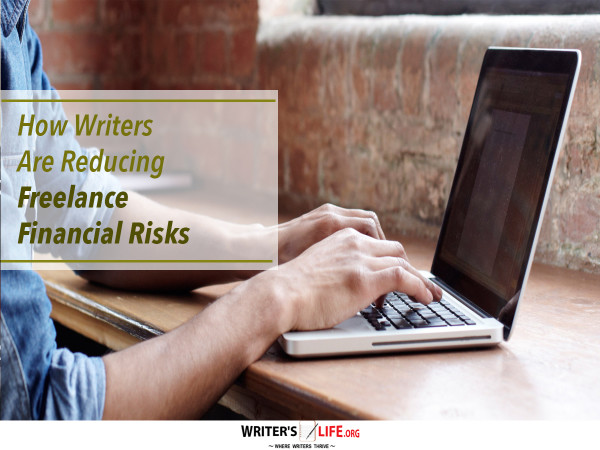- How To Tackle Jealousy In Creative Writing
- Common Submission Mistakes
- How To Stop Your Blog Becoming Boring
- The One Thing Every Successful Writer Has In Common
- How To Make Yourself Aware Of Publishing Scams
- Why Almost ALL Writers Make These Grammar Mistakes At Some Point
- 5 Tips For Authors On How To Deal With Rejection
- Top Mistakes to Avoid When Writing a Novel
- How to Avoid Common New Writer Mistakes
- 10 Mistakes New Fiction Writers Make
How Writers Are Reducing Freelance Financial Risks

Share, Pin or Retweet If You Love Writing.
Are you scared to take the plunge into freelance writing, because it feels too risky?
After all, there’s no regular paycheck coming in. No paid sick time. And for those of us in the US and some other places, no healthcare unless we buy some on our own.
I meet a lot of would-be freelance writers who’re still slogging away at the day job they hate, mainly because they worry about whether they’ll be able to pay the bills as a freelancer.
Understand that financial stress, health struggles, relationship issues – these are all real problems that are part of the lives of most freelancers. If the worry is that you cannot make a living from your craft then you might want to check out the Writer's Life Get Paid to Write Course we offer that teaches you how to support yourself.
As the world shifts increasingly over to a freelance/solopreneur economy — we’re expected to make up half the economy by 2020 — it would be nice if our governments did more to support independent contractors. But so far, not a lot progress on that front, as Elaine Pofeldt recently pointed out on Forbes.
Fortunately, there are a few emerging ideas that may help make freelancing less risky:
1. Income insurance
Financial services startup Even helps you figure out what your average monthly pay is. Then, it sets up an FDIC-insured savings account that socks away any extra money you earn in good months. When you have a down month, your emergency fund is there for you.
Don’t have any money in the savings account? Even gives you an interest- and fee-free advance against your next big earning month. The site charges $3 a month, they’re based in Oakland, Calif., and launched in January. I have to say, I’m intrigued!
Also, if you want, you’re free to withdraw the overage you’ve saved at any point. So if you’re not using it (hopefully income just keeps rising!) and it piles up, you can just cash it in if you like.
Drawbacks: Looks like you’d need to have been freelancing for a few months already, to be able to create an average and start using the program. But knowing you could create a steady monthly income and iron out the bumps-and-lumps has some serious appeal.
Also, Even co-founder Jon Schlossberg tells me they don’t yet support freelancers! For now, it’s for employed workers with irregular hours and paychecks. They’re hoping to roll it out to freelance workers next year…so stay tuned. It would be great to see other companies spring up to offer this sort of service to freelancers, too.
2. Get paid sick days
Getting sick can be a disaster for freelancers. Clients can get pissed off and drop you, and obviously there’s no pay for days you can’t work.
Or is there? The Guardian recently reported on sick-leave options that are emerging for freelancers, including Broodfonds in The Netherlands. There, workers pay into a sick-time pool and can draw out if they become ill.
In the UK, workers can join The Association of Indpendent Professionals and the Self Employed (IPSE), and receive a sick-time insurance policy as a member benefit. Self-employed UK workers can also purchase income protection insurance.
This area is of high interest to me personally, because I tried and failed twice to get a disability insurance policy here in the US — we need more options here!
3. Avoid getting stiffed
Too many freelance writers end up getting stiffed by clients, or waiting ages for payment. In the EU — you lucky ducks — a new law allows you to tack a €40 fee onto bills that are late 60 days or more.
Another option for compelling payment is mutual invoicing societies, such as SMart in Belgium. Now available in eight European countries (but not the UK) at the moment, SMart gives you a large group that can throw its weight behind you and apply pressure for collection of unpaid invoices. If it’s not successful in helping you collect, SMart’s mutual guarantee fund pays you out.
Got to say I *love* this idea — hope to see it come to the US!
Advocate for change
The European Freelancers Movement has formed to try to put the needs of freelance businesses on countries’ political agenda. If you live in this region, you can sign their manifesto, join, and get involved in advocacy. Of course, here in the U.S., there’s also The Freelancers Union.
Let’s hope more ideas like these emerge in the coming months and years, to help people who want to freelancer make the leap.
It also helps to stay organized and on schedule in your freelance writing career so that you are not picking up low paying freelance work at the last minute.
The Get It Done, Writer's Tookit CLICK HERE!, which is an ebook/audio CD combo set that teaches writers how to become more disciplined and how to find the time to write. Setting goals and knowing exactly what direction you are going in with your project with a progression of deadlines can definitely help alleviate both creative and financial anxiety.
This article by Carol Tice was originally published with the title 3 Emerging Ways To Make Freelancing Less Risky at http://www.makealivingwriting.com/3-emerging-ways-to-make-freelancing-less-risky/























